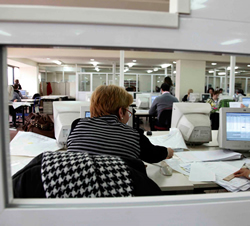 Greece ranks third in member countries of the Organisation for Economic Cooperation and Development (OECD) for the percentage of its Public Servants aged over 55 years, a new report from the OECD has found.
Greece ranks third in member countries of the Organisation for Economic Cooperation and Development (OECD) for the percentage of its Public Servants aged over 55 years, a new report from the OECD has found.
More specifically, while the average for the OECD countries is 26 per cent, in Greece that percentage is 37 per cent.
With 48 per cent, Italy has the highest percentage of middle-aged Public Servants, followed by Spain with 46 per cent.
In Greece, the implementation of restrictive measures on new recruitment in the public sector during the decade of the country’s financial crisis certainly played a role as new blood was not allowed to enter.
However, a public administration official says the biggest problem is not age but mentality.
“When I told an employee many years ago I wanted to show him how to make computerised receipts and stop writing them by hand, he replied: ‘What do I need these for? In 20 years I will retire’,” the unnamed official said.
According to the OECD, countries with older bureaucrats are more likely to experience difficulties in enacting necessary policies.
Experts note that Public Services must be able to cope with the challenge of digital transformation on the one hand, but also with the new demands of citizens in their relationship with the State on the other.
“As the entire population of the European Union, and Greece in particular, is aging, it will need more and more help and support,” the OECD said in its report.
“Public officials will also need to develop the ability to help and interact effectively with citizens. In particular, an increasing number of necessary documents can now be searched for digitally, which requires different processing times.”
It said the familiar phrase of Public Servants: “We need another document” would no longer be used as an alibi for delay.
Athens, 22 September 2022










